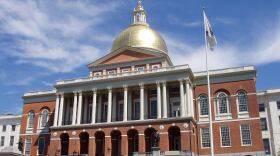Thursday afternoon, the Massachusetts Senate approved a $1 billion tax relief compromise plan on a 38 to 1 vote. The move follows a vote from the House Wednesday to OK the package 155 to 1. The compromise bill’s progression through both chambers of the legislature signals the end of a long impasse on Beacon Hill over tax relief, which was notably absent from the budget passed this summer. The plan has been the subject of criticism since its embryonic form this spring, when progressive groups and legislators decried Democratic Governor Maura Healey’s initial $742 million tax relief program as too generous to wealthy residents. One of those voices has been from organized labor, including the 115,000-worker strong Massachusetts Teachers Association with its 400 locals across the commonwealth. WAMC spoke with MTA President Max Page about why he opposes the compromise plan.
PAGE: The Massachusetts Teachers Association put an enormous amount of human and financial energy into passing the Fair Share Amendment, which asks the very wealthiest people in the commonwealth, to pay a little bit more in order to invest in public schools and colleges and transportation systems. That was just last November, and we passed a budget a month ago that really did begin those major reinvestments. So, we find it rather stunning to see the legislature now give back several hundred million dollars to some of the wealthiest people and largest corporations in the commonwealth. So that is very, very disappointing. There are certainly elements of this tax package that will help working people, and we did manage to convince the legislature to close a loophole that would have allowed the wealthy to get away with even more. But I would say we're very, very disappointed that this is what a Democratic governor and Democratic legislature would do, which is give back hundreds of millions of dollars when we just, not even a year ago, the voters voted to really ask the very wealthiest to pay a bit more so we can have the investments in schools and transportation that we need.
From the union's perspective, what would a more equitable tax relief package look like?
Well, first thing, they just would- There is no evidence that the kinds of tax cuts that they just gave, giveaways to the very wealthy, actually help the so-called competitiveness of Massachusetts. There's no evidence from other states that these tax cuts bring more businesses into a state or prevent businesses or the wealthy from leaving. We have proved that over and over again during the campaign that ultimately resulted in the Fair Share Amendment victory. So right off the bat, they should never have done those giveaways. I would say that the tax cuts for working people, some of those, of course, are very good. But what we really need, rather than give people, working class people a few hundred dollars more for childcare, we should actually be building a great public early ed and childcare system. We should be investing, as we are promoting, high quality, debt free public higher education. To drain money, hundreds of millions of dollars a year going forward, with these tax cuts away from the investments that we need is simply wrong.
Some of these objections to the tax package plan, you've made clear for months now from the union- What do you think that says about how both the legislature and the current administration is listening to groups like the MTA over the course of this tax relief process?
Well, I would say there are many groups that support, and we did as well as the Raise Up Mass coalition, supported some of the good tax cuts, as I say. I support those, although I think there's a better way to build access to affordable housing and access to childcare and early education. But certainly, providing money for working people is good. So, the legislature heard that. And they absolutely did hear us in the face of fierce advocacy from right wing business groups, they did hear us on this loophole called the single filer loophole that would have allowed very, very wealthy individuals and families to get away with paying far less of their fair share in taxes. So, in that way, certainly our advocacy convinced the legislature to do the right thing. And one of the big pieces was lowering the short-term capital gains tax. That's a tax really on short-term traders, financial investors, which is a very small, small, very wealthy portion of the state. So, instead of going all the way down from 12% down to 5%, they split it in the middle. So, we'll call that a victory of getting the less bad.
What's your message at this point to folks in the commonwealth about where the legislature is at with its responsiveness to the demands of working people in the commonwealth?
They did move forward, and then we ultimately won passage of the Fair Share Amendment. And I will say that we're overall very pleased with the state budget that came out, in that they really separated the money out from Fair Share. So, it really is going, about a half a billion dollars, to pre-K, 12, and public higher education, and the other half billion to roads, bridges and public transportation. So that's good, that's money that our coalition and the population won. So, it's good that they are, the legislature and governor, are spending it appropriately and not supplanting money that already exists, but adding the things that we need. So, we're just going to keep building on making sure that Fair Share monies are fully spent in the ways that really help working people.







